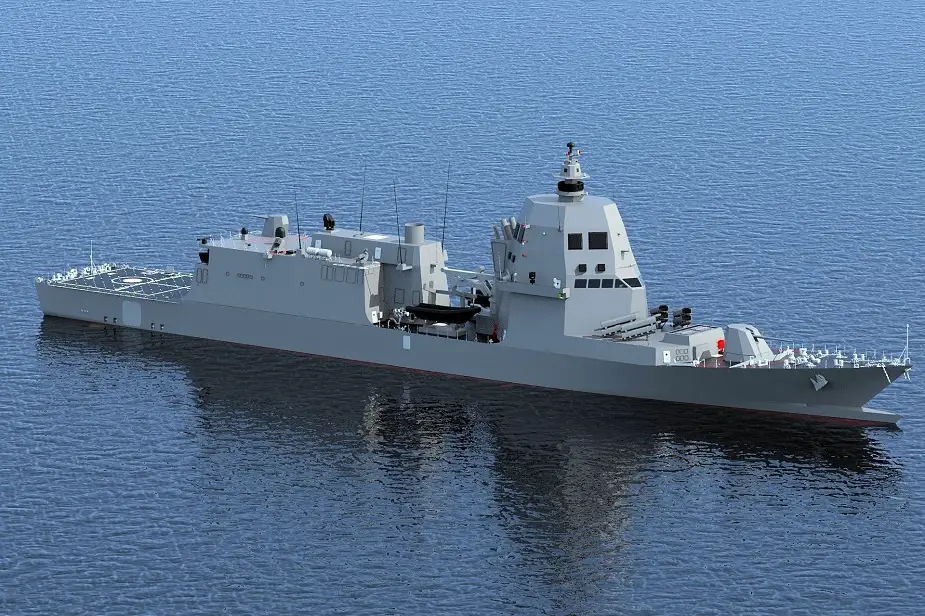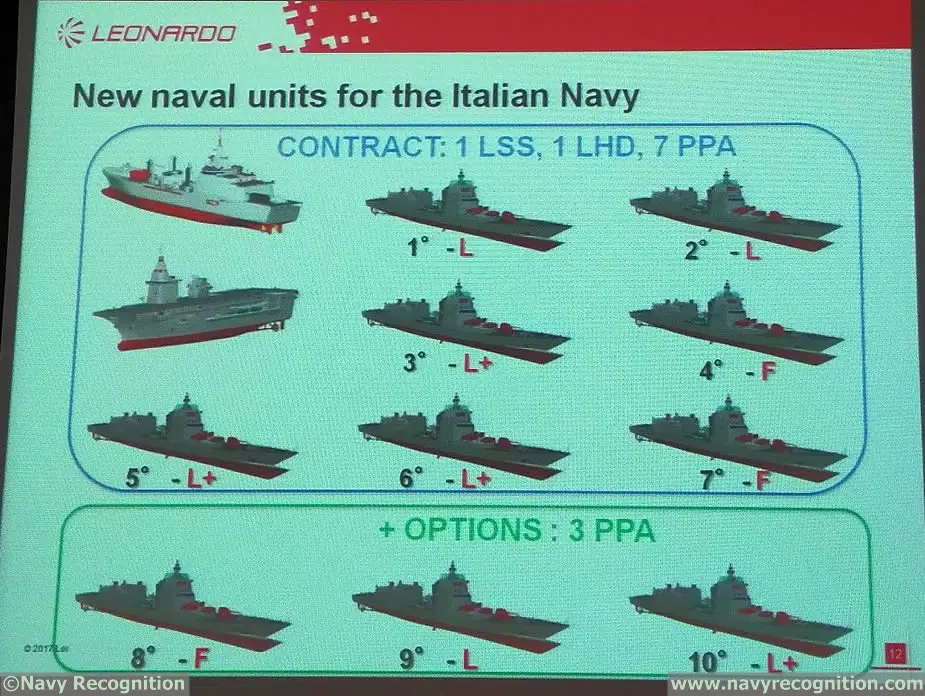Breaking news
PPA to bring BMD Capability to Italian Navy in 2024.
The Italian Navy (Marina Militare) will get Ballistic Missile Defence (BMD) capability in 2024 with the delivery of its first PPA (Pattugliatore Polivalente d'Altura or Offshore Multipurpose Patrol Ship) vessel in the "Full" configuration. Captain Francesco Gennaro Esposito, Italian Navy General Staff (MARISTAT 7°) future vessels ship design and CMS department, confirmed the information to Navy Recognition during a recent visit at the Leonardo naval test and integration facility near Rome.
 Artist impresson of a PPA "Full" vessel. Italian Navy image.
Artist impresson of a PPA "Full" vessel. Italian Navy image.
"The PPA Full version will be able to embark and use the Aster 30 Block 1NT that is the anti-ballistic missile with the support of the radar system of the future LHD in terms of early warning detection" said Captain Esposito.
The long range detection of ballistic missiles will be realized with the L-band AESA radar based on gallium nitride (GaN) technology which allows the radar to have better performance in terms of range. The missile tracking capability will be provided by the C-band element of the new dual-band radar developed especially by Leonardo for the PPA.
An MBDA Italy representative explained that PPA Full will be able to detect and engage ballistic missiles on their own or in cooperation with other early warning sources via Link 16. He added that PPA Light+ variant could potentially have that BMD capability but the first real BMD capable ship for the Italian Navy will be the first PPA Full variant to be delivered in 2024.
About the Aster system
The Aster 30 Block 1 NT missile evolution consists in a new seeker operating in Ka band, replacing the current Ku band seeker, as well as a new improved weapon controller. This change delivers a significant performance enhancement.
The new missile will be capable of intercepting threats of the entry of the MRBM (Medium Range Ballistic Missiles) domain whereas the current Aster 30 Block 1 deals with SRBM (Short Range Ballistic Missiles) of up to 600 km range and it will also be capable of dealing with missiles with separable warheads. This new version of Aster will extend the antiballistic capability of the missile from a range of 600km up to 1,500km. On December 20, OCCAR (Organisation for Joint Armament Cooperation) notified to EUROSAM, a consortium formed by MBDA and Thales, the amendment 1 of the contract for the “B1NT” programme. This amendment embodies the participation of Italy in the programme. It follows the notification of the initial contract under French mandate on December 23, 2015, and the Arrangement of Cooperation, signed in June 2016 by the French and Italian Defence Ministers, laying down the framework of responsibilities and rights of the two countries vis-a-vis the missile to be developed in cooperation, and its multiple applications in land and naval defence systems against air attacks and ballistic missiles.
Launched in 1988 by France and Italy, the Aster family (also known as FSAF – Future Surface-to-Air Family) exists as a ground based air and missile defence system (SAMP/T) in service with the Italian Army and the French Air Force. It is also deployed in its naval versions for the self defence of the French and Italian Navies aircraft carriers and provides the self, local and fleet area defence capability on British, French and Italian frigates and destroyers. The UK, which deploys Aster missiles on its Type 45 destroyers, declared during the Franco-British summit held in Amiens in March 2016, that it is considering the new Block 1 NT version for this class of ships.

About PPA
As part of the 2014-2015 Italian Naval Law (Legge Navale), the Italian Navy will take delivery of 1 LHD amphibious vessel, 1 LSS logistics support vessel and 7 PPA (2x Light, 3x Light + and 2x Full) plus an option for 3 more PPA (1 in each configuration).
The multi-purpose off-shore patrol vessel is a highly-flexible ship that can perform a range of tasks including patrol, search and rescue and civil protection operations. In its most extensively equipped form, the PPA can act as a frontline battleship.
Operations conducted by PPA ships will include the monitoring of maritime zones, preserving international water rights, counter-terrorism, detecting and interdicting smuggling, helping to control illegal immigration and supporting the Navy’s amphibious operations forces. The vessels will also provide humanitarian assistance, shipwreck recovery and support in the event of disasters.
With a modular design, PPA vessels can be equipped in various configurations according to the specific mission it will perform. Contractually, three levels of vessel will be provided, a “light” configuration for patrol missions which also includes integrated self-defence capabilities, a “light-plus” variant and a “full” configuration equipped with the ultimate in defence capabilities. PPA units can also deploy RHIB (Rigid Hull Inflatable Boats) up to 11m long via a side-crane or a stern-located ramp.


























